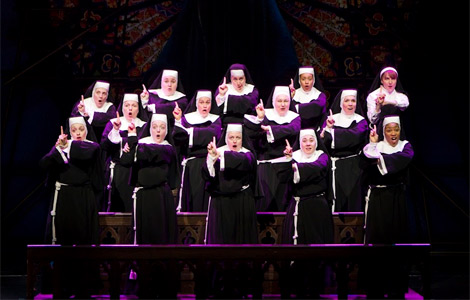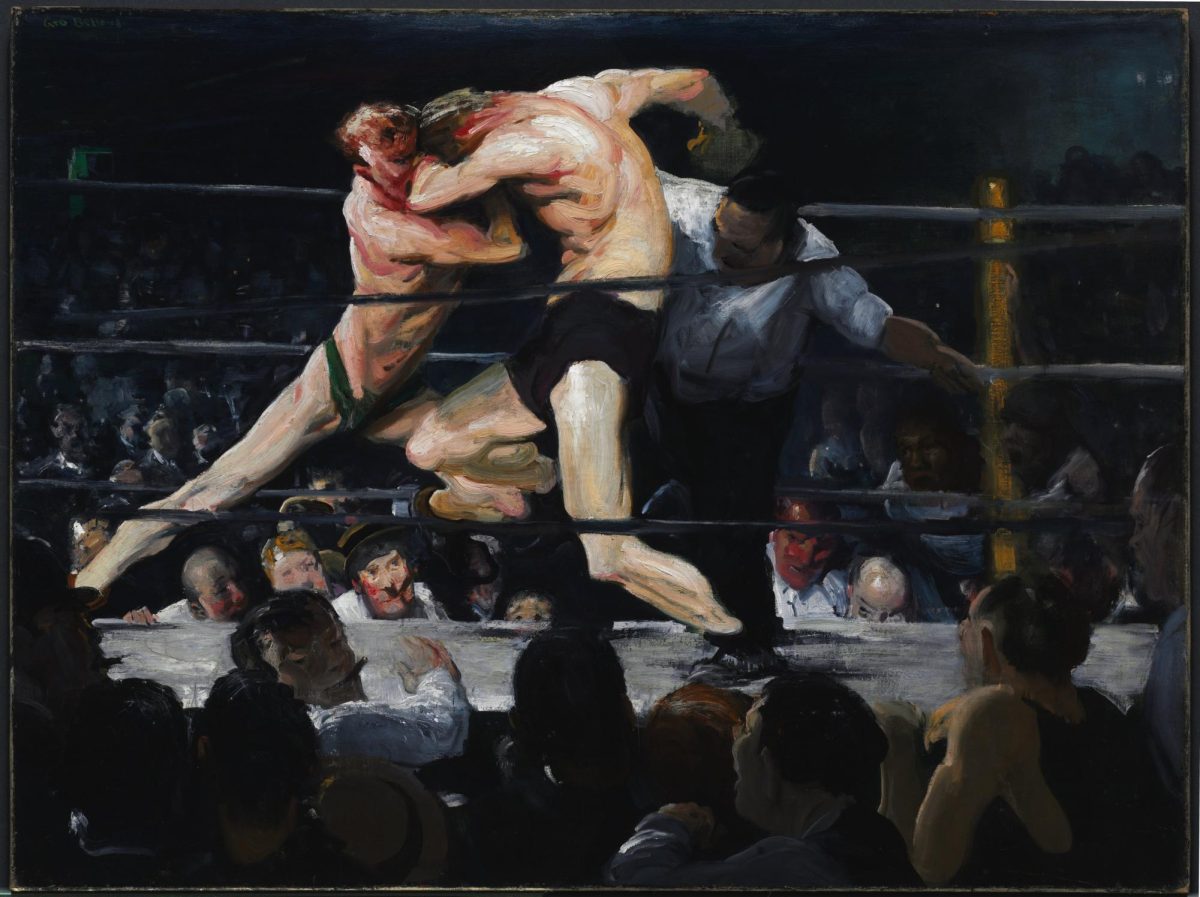The playbill reads “Gloriously Broadway”.
“Sister Act,” which runs at Playhouse Square through March 17, is something far, far from that phrase.
This is a cheap show: bland, boring and barren of buzz, and a sobering and depressing showcase of uninspired commercial artistry. One might ask how a talented composer such as Alan Menken and a legendary actress like Whoopi Goldberg, who originated the title role in the film version, could have gotten bribed to be involved in such a misfire. With international ticket sales through the roof, this show, unfortunately, isn’t going anywhere.
Deloris Van Cartier (the on and off Ta’Rea Campbell) is a nightclub dancer in Philadelphia (“Take Me to Heaven”) who has dreams of stardom (“Fabulous, Baby!”) away from her gangster boyfriend Curtis Jackson (a stereotypical Kingsley Leggs). She breaks up with him but is then vengefully pursued by him and his nephews: the overweight black TJ (a charming Charles Barksdale), the womanizing country boy Joey (a safe Todd A. Horman), and the Spanish-speaking Pablo (an acceptable Ernie Pruneda) in “Lady in the Long Black Dress.” Deloris runs to the cops for protection, and meets Eddie (the cast’s silver lining, an inspiring E. Clayton Cornelious), an acquaintance from high school who resolves to win her over (“I Could Be That Guy”). He sends Deloris to a convent to hide where she meets the head matriarch Mother Superior (a decent Hollis Resnik) who explains the closed world of the convent (“Here Within These Walls”). She meets the other nuns, including the incompetent yet lovable Sister Mary Patrick (the humorous Florrie Bagel), the old and cynical Sister Mary Theresa (a joyless Karen Elliot), and the caged singer Sister Mary Robert (a convincing Lael Van Keuren) in “It’s Good to be a Nun.” Deloris gains the admiration of the nuns and begins to modernize them and inspire them to sing to their hearts content in the church choir (“Raise Your Voice”). Mother Superior despises this development, but cannot object as donations and attendance have risen (“Sunday Morning Fever”). Eddie suddenly finds and arrests Curtis, and tells Deloris she can leave the convent, to the dismay of the nuns. Sister Mary Robert begs Deloris to bring her along (“The Life I Never Led”), and Deloris ultimately returns to the convent to lead the choir in a performance for the pope (“Sister Act”).
The orchestra is light, and the actors sing within their comfort zone, and when they need to, suddenly belt acceptably yet perhaps uncomfortably. Deloris and Sister Mary Robert sound just good enough for a touring Broadway production. Sometimes when all the nuns are singing, it sounds more like a children’s television show, with characters singing brainless bologna in unison while trying to teach some undefined moral lesson through simple lyrics and catchy music.
The costumes look like they could’ve been purchased from a combination of JC Penney and The Salvation Army, as glittering gowns, habits (nun outfits), and street garments clothe the performers in a thrifty, unappealing way.
The sets are acceptable at best, with the highlight piece being the column of windows in the church on either side of the stage, which, in the finale, are illuminated in succession like streetlights, yet the immediate visual appearance is more akin to Sketchers light-up sneakers than anything more elaborate.
To understand the hollow acting in this show, it is necessary to understand a principle from the Stanislavski system for an actor. Stanislavski (the legendary acting teacher from the Moscow Art Theatre) states that there are two kinds of acting. One is when the actor personally and truthfully experiences and feels every moment onstage through the adopted perspective of a character, unaware of the audience, resulting in an authentic, satisfying performance. The second way is when an actor consciously presents his performance to the audience with unrealistic and exaggerated dramatic maneuvers, which, even to the untrained eye, looks as such and is not worth anybody’s time. The acting from everyone in Sister Act save for Eddie is this second way.
One could easily compare this entire show to be the musical equivalent of a marathon of episodes of “My Wife and Kids.”
It so ignores its own faults and underestimates its audience that over the course of one minute you’ll see an archbishop, steeped in the traditions of the church, horrifyingly look on at the dance led by Deloris in the convent with the other nuns, only to inexplicably join in dancing with undeniable yet implausible skills.
Theater often is an event that people pay for to be surprised and boldly entertained. “Sister Act” tries its best not to offend anyone with its carefully written jokes, but it offends the entire audience by lacking the boldness to go where drama must go to solidify its significance as escapist entertainment.
The story is anything but dramatic, and the jokes are anything but funny.
“Sister Act” plays down to the crowd with sterile middlebrow jokes, a predictable story and amateurish acting, and ends up being a rare, uncooked musical that needed more time in preproduction. If you are a self-respecting adult, you should not see “Sister Act.”















